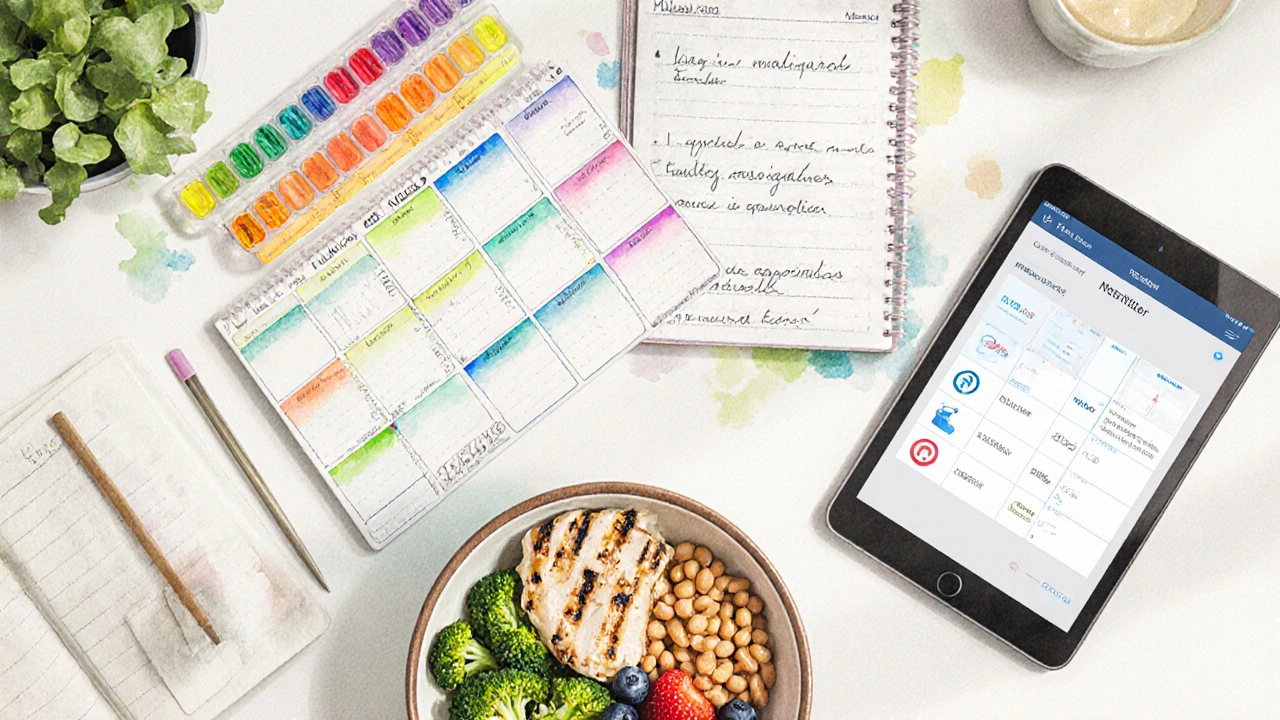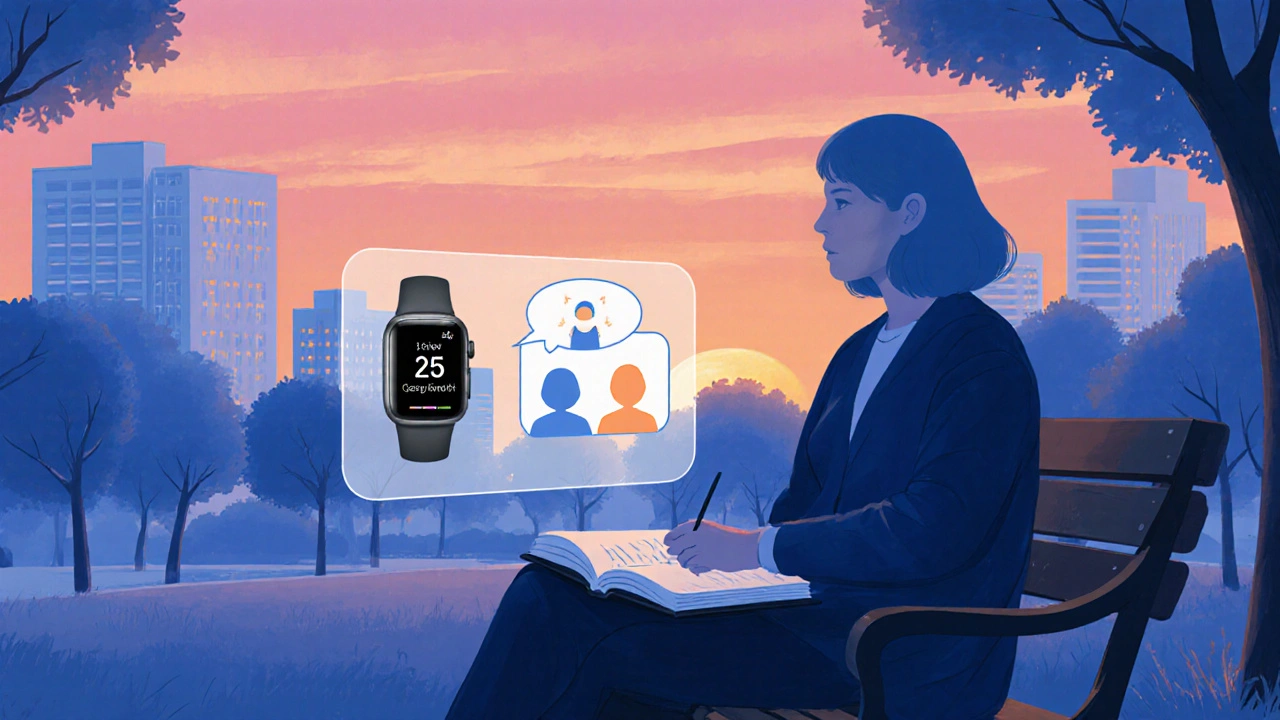CLL Medication Tracker
Add New Medication
Active Medications
Side Effect Log
Drug Interaction Alert
When a loved one is diagnosed with chronic lymphocytic leukemia, the caregiver steps into a vital role that stretches far beyond simple day‑to‑day chores. From mastering medical jargon to soothing fears, caregivers often become the patient’s strongest ally. This guide breaks down exactly what you need to know, how to act, and where to find help - so you can feel confident rather than overwhelmed.
Key Takeaways
- Understand CLL basics so you can speak the same language as doctors.
- Learn the top three caregiver responsibilities at each disease stage.
- Apply practical tips for medication management, symptom monitoring, and emotional support.
- Navigate the healthcare system efficiently - appointments, lab work, and insurance.
- Tap into reliable resources, support groups, and clinical‑trial databases.
What Is Chronic Lymphocytic Leukemia?
Chronic lymphocytic leukemia is a slow‑growing cancer of the blood that originates in the bone marrow and affects a type of white blood cell called lymphocytes. It typically progresses over years, often without severe symptoms in early stages, but can later compromise the immune system and cause fatigue, infections, and enlarged lymph nodes. Roughly 20,000 new cases are diagnosed in the United States each year, according to the latest leukemia registry.
Understanding three core facts helps caregivers stay ahead:
- CLL is usually indolent - many patients live for decades with proper monitoring.
- Treatment decisions hinge on disease stage, genetic markers, and patient health.
- Because the disease weakens immunity, infection prevention is a daily priority.
The Caregiver’s Core Role
Caregiver is anyone who assists a patient with medical, emotional, or practical tasks on a regular basis. In CLL, this role can be split into three overlapping domains:
- Medical liaison - coordinating with the hematologist, tracking lab results, and ensuring medication adherence.
- Daily‑life facilitator - handling appointments, transportation, nutrition, and activity planning.
- Emotional anchor - providing reassurance, listening, and connecting the patient to mental‑health resources.
Balancing these domains prevents burnout and improves outcomes.

Practical Daily Tasks by Disease Stage
| Stage | Primary Medical Tasks | Daily Living Support | Emotional Support Focus |
|---|---|---|---|
| Stage 0-I (Early) | Track CBC counts; schedule regular blood work every 3-6 months. | Encourage gentle exercise; maintain balanced diet rich in protein and vitamins. | Offer reassurance that “watchful waiting” is a valid plan; discuss future expectations. |
| Stage II-III (Intermediate) | Assist with oral chemotherapy or targeted therapy (e.g., ibrutinib) administration; monitor side‑effects. | Coordinate medication timing; arrange transportation for infusion appointments. | Validate worries about side‑effects; introduce relaxation techniques like guided breathing. |
| Stage IV (Advanced) | Help manage complex regimens including immunotherapy; liaise with palliative‑care team. | Focus on comfort‑focused activities; manage wound care or infection‑prevention measures. | Facilitate end‑of‑life conversations; connect with hospice counselors and support groups. |
This table offers a quick reference, but every patient’s journey is unique - adjust tasks as needed.
Medication Management Tips
CLL treatments range from oral agents like ibrutinib to intravenous immunotherapy. Keep these steps in mind:
- Create a pill‑box calendar. Label each compartment with day and time; set phone alarms.
- Document side‑effects. Use a notebook or app to note nausea, fatigue, or rash; share with the hematologist.
- Check drug interactions. Many CLL drugs interact with common over‑the‑counter meds like NSAIDs; always verify with the pharmacist.
- Keep a medication list. Include drug name, dose, frequency, and prescribing doctor. Update after every clinic visit.
If a dose is missed, the rule of thumb is: take it as soon as remembered unless it’s within 2hours of the next scheduled dose - then skip and continue the regular schedule. Never double‑dose.
Nutrition and Lifestyle Guidance
Because CLL can weaken the immune system, nutrition becomes a frontline defense. Here’s what research from the Leukemia & Lymphoma Society (2024) recommends:
- Protein‑rich foods - lean meats, beans, Greek yogurt - support blood cell production.
- Antioxidant vegetables - broccoli, berries, spinach - help combat oxidative stress.
- Limit raw or undercooked foods. Bacteria risk is higher when immunity is low.
- Stay hydrated. Aim for 8‑10 glasses of water daily to aid kidney function.
Encourage the patient to keep a simple food diary; spotting patterns (e.g., increased fatigue after sugary snacks) can guide adjustments.
Emotional and Mental‑Health Support
Living with CLL often triggers anxiety, depression, and a sense of loss. Caregivers can play a proactive role:
- Schedule regular “check‑in” conversations where feelings are the focus, not treatment logistics.
- Introduce mindfulness apps (e.g., Headspace, Calm) - a 10‑minute daily practice reduces cortisol levels.
- Connect the patient to peer‑support groups. The CLL Society hosts virtual monthly meetings that have shown a 30% reduction in reported loneliness.
- If mood swings intensify, seek a referral to a psycho‑oncologist - a specialist trained to address cancer‑related distress.

Navigating the Healthcare System
Appointments, insurance paperwork, and lab results can feel like a maze. Follow this streamlined workflow:
- Maintain a binder (or digital folder) labeled “CLL Care”. Include consent forms, test results, medication lists, and insurance cards.
- Use a calendar app to set reminders for blood draws, infusion days, and follow‑up visits. Color‑code by type (lab, chemo, consult).
- Contact the hematology office 48hours before each visit to confirm test requirements.
- After each appointment, write a brief summary: what was discussed, next steps, and any new prescriptions.
Having a concise summary ready saves the doctor’s time and ensures nothing slips through the cracks.
Resources, Support Networks, and Clinical Trials
Being informed empowers caregivers. Below are vetted resources you can bookmark:
- American Cancer Society - CLL page: up‑to‑date treatment guidelines and patient stories.
- CLL Society: free webinars, a caregiver‑specific newsletter, and a national helpline.
- ClinicalTrials.gov: filter by “Chronic lymphocytic leukemia” and “PhaseII” to find trials that accept adult patients with specific genetic markers (e.g., del(17p)).
- National Comprehensive Cancer Network (NCCN) Guidelines: downloadable PDFs that outline standard of care - useful for discussing options with the hematologist.
When evaluating a trial, ask these three questions:
- What is the primary endpoint (overall survival vs. quality of life)?
- What are the eligibility criteria - especially regarding prior therapies?
- What are the potential side‑effects and the support plan for managing them?
Preventing Caregiver Burnout
Taking care of yourself isn’t selfish - it’s essential. Here are evidence‑based self‑care tactics:
- Schedule at least one “me‑time” activity per week (e.g., a walk, hobby, or coffee with a friend).
- Consider respite care services. A 2023 study showed that caregivers who used a weekly respite reported a 25% lower stress score.
- Keep a personal journal. Writing about challenges helps process emotions and spot early warning signs of fatigue.
Remember, a rested caregiver can provide better, safer, and more compassionate care.
Frequently Asked Questions
How often should I schedule blood tests for an early‑stage CLL patient?
For stage 0-I, guidelines recommend a complete blood count (CBC) every 3 to 6 months, unless the hematologist notices a trend that warrants more frequent monitoring.
Can I give over‑the‑counter pain relievers while the patient is on ibrutinib?
Aspirin and NSAIDs can increase bleeding risk when combined with ibrutinib. Always consult the prescribing hematologist or pharmacist before adding any OTC medication.
What signs of infection should trigger an urgent doctor's visit?
Fever above 100.4°F (38°C), chills, persistent cough, painful urination, or rapidly worsening fatigue are red flags. In immunocompromised CLL patients, act quickly - call the hematology office or go to the emergency department.
Are there specific diets that can slow CLL progression?
No diet has been proven to halt CLL, but a balanced Mediterranean‑style diet supports overall health and immune function. Emphasize whole grains, lean proteins, healthy fats, and plenty of fruits and vegetables.
How can I find a local support group for CLL caregivers?
Start with the CLL Society’s "Find a Support Group" tool, filter by zip code, and select either in‑person or virtual meetings. Hospital social workers often have listings as well.


Kristen Moss
October 14, 2025 AT 12:23Just get them on the meds and stick to the schedule.
Rachael Tanner
October 22, 2025 AT 20:23Using a pill‑box calendar paired with phone alarms can save you countless trips back to the pharmacy, and logging side‑effects in a simple notebook makes the next doctor visit a breeze. The guide’s medication tracker is a solid start, but consider a dedicated app that syncs with your phone’s reminders. Also, never underestimate the power of a weekly review of lab results – it keeps you ahead of any sudden CBC drops. If you ever feel overwhelmed, a quick chat with the pharmacist can clarify drug interaction worries before they become a crisis. Consistency is key, so keep that list updated after every infusion.
Debra Laurence-Perras
October 31, 2025 AT 03:23Remember that you’re not alone in this journey; countless caregivers have walked the same path and built supportive circles online. The emotional anchor part of the guide is spot‑on – a short daily check‑in can lift spirits more than a marathon conversation. Try adding a shared journal where the patient can scribble thoughts, and you can add encouragements. Also, the nutrition tips are great – a splash of olive oil on veggies does wonders for immune health. Keep breathing, stay hopeful, and celebrate every tiny win together.
dAISY foto
November 8, 2025 AT 11:23Whoa, this guide is a powerhouse of practical magic! Picture this: you’ve got the medication list, the side‑effect log, and the interaction alert all dancing together in perfect harmony. Every morning you fire up the app, tap the pill‑box icon, and boom – you’re on top of the schedule. It’s like having a superhero sidekick that never sleeps. And when the patient feels low, you’ve got that emotional anchor toolkit ready to launch – mindfulness, jokes, a quick meme binge. The table that breaks down tasks by stage is pure gold – no more guessing what to do next. Keep that energy flowing, and don’t forget to reward yourself with a coffee after a week of flawless dosing!
Ian Howard
November 16, 2025 AT 19:23Love the energy you poured into that summary! Adding a few extra safeguards can tighten the routine even more. First, set a backup alarm on a separate device in case the phone glitches – redundancy saves lives. Second, keep a printed one‑page cheat sheet of the top three drug interactions for quick glance during infusion days. Third, involve the patient in the medication prep; even a simple “what’s next?” cue boosts their sense of control. Finally, schedule a brief 5‑minute debrief after each appointment to jot down any new instructions before they fade. These tweaks turn good into great.
Chelsea Wilmer
November 25, 2025 AT 03:23Being a caregiver for someone with chronic lymphocytic leukemia is an intricate ballet of medical vigilance, emotional stewardship, and relentless self‑care, and the nuances often escape even the most well‑meaning supporters. First, the sheer volatility of blood counts demands a systematic approach: record every CBC result in a dedicated spreadsheet, noting trends and flagging any abrupt declines, because early detection of progression can dramatically alter therapeutic windows. Second, the pharmacologic landscape of CLL is a maze of oral agents, infusions, and targeted therapies, each with its own adherence pitfalls; integrating a color‑coded pill‑box with digital reminders not only mitigates missed doses but also anchors the routine in the patient’s daily rhythm. Third, side‑effect tracking should transcend a simple checklist; employ a daily symptom diary that captures intensity, timing, and contextual factors such as meals or stressors, then review this log collaboratively with the hematologist to fine‑tune dosage or add supportive meds. Fourth, nutrition transcends mere calories: prioritize protein‑rich sources like lean poultry and legumes to bolster hematopoiesis, while sprinkling antioxidant‑dense vegetables – think broccoli, berries, kale – to combat oxidative stress that can aggravate marrow suppression. Fifth, hydration is a silent hero; aim for eight to ten glasses of water daily, especially when on agents like ibrutinib that can affect renal clearance. Sixth, infection prophylaxis is paramount: enforce hand hygiene, avoid raw or undercooked foods, and ensure vaccinations are up‑to‑date, but remember live vaccines are contraindicated in many CLL regimens – a nuance that often slips past patients. Seventh, the emotional terrain is equally treacherous; regular, unstructured “feelings‑only” conversations can defuse anxiety that otherwise festers into depression, and integrating mindfulness apps for brief, twice‑daily sessions can lower cortisol and improve sleep quality. Eighth, leveraging community resources such as the CLL Society’s virtual support groups provides a lifeline of shared experiences, reducing the isolation that caregivers frequently report. Ninth, navigating the bureaucratic labyrinth of insurance approvals calls for a meticulously organized binder – separate sections for consent forms, lab results, medication lists, and correspondence – so that any claim dispute can be resolved swiftly. Tenth, when the disease reaches an advanced stage, palliative‑care integration should not be viewed as surrender but as an added layer of comfort, focusing on symptom control, advanced‑care planning, and psychosocial support. Eleventh, caregiver burnout is a real and present danger; schedule at least one hour per week for a personal hobby, exercise, or simply a quiet walk, and consider respite services to replenish emotional reserves. Twelfth, the importance of documenting every medical interaction cannot be overstated – a brief post‑visit summary emailed to the patient and saved in the binder ensures no detail is lost in the rush of clinic flow. Thirteenth, always maintain an up‑to‑date medication list that includes over‑the‑counter drugs and supplements; interactions with NSAIDs and anticoagulants like warfarin can precipitate life‑threatening bleeding when combined with ibrutinib. Fourteenth, be proactive about clinical trial opportunities: filter databases by genetic markers such as del(17p) and discuss eligibility early, because enrollment windows can close swiftly. Fifteenth, finally, practice self‑compassion; acknowledge that perfection is unattainable, and celebrate the small victories – a day without missed doses, a calm dinner, a shared laugh – as the true markers of success in this ongoing marathon.
David Stout
December 3, 2025 AT 11:23Your marathon analogy hits home; those small victories are the real trophies. Adding a quick “win of the day” note in the binder can keep morale high for both of you.
Pooja Arya
December 11, 2025 AT 19:23The guide’s cultural empathy shines through, especially when it nudges caregivers to respect the patient’s personal rituals around meals and rest. It’s refreshing to see a medical guide that doesn’t ignore the human side of treatment. I’d also suggest sprinkling in a note about the benefits of gentle yoga for fatigue management – it’s low impact yet powerful. Lastly, reminding caregivers to check in with their own primary care doctor periodically can prevent their health from slipping under the radar. Overall, a well‑rounded resource.
Matthew Tedder
December 20, 2025 AT 03:23Absolutely, a quick yoga session can boost energy without overtaxing the immune system. Scheduling a monthly check‑in with your own doctor is a smart move to stay ahead of caregiver fatigue.
Michael Wall
December 28, 2025 AT 11:23Keep it simple and stick to the schedule.
Christopher Xompero
January 5, 2026 AT 19:23yeah, but dont forget to double check the med list for any new pills or vits that might cause issues lol.
Irene Harty
January 14, 2026 AT 03:23Whilst the guide is exhaustive, it regrettably omits a critical appraisal of the pharmaceutical industry's influence on treatment protocols. A dispassionate analysis would highlight the conflicts of interest that may bias therapeutic recommendations. Moreover, the absence of alternative, non‑pharmacologic interventions is a glaring oversight. Future revisions should integrate a balanced discourse on lifestyle modifications independent of profit‑driven motives.
Jason Lancer
January 22, 2026 AT 11:23Points taken; the interplay between industry and care pathways deserves transparent discussion. Incorporating lifestyle data alongside drug regimens would indeed strengthen the guide.